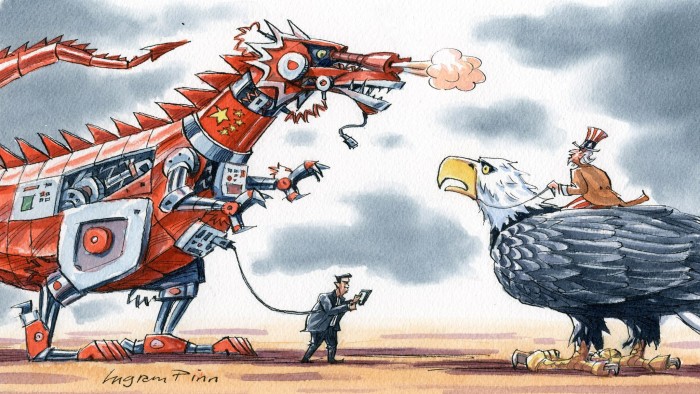Opinion today: China’s tech supremacy

This article is from today’s FT Opinion email. Sign up to receive a daily digest of the big issues straight to your inbox.
There is no doubt that recent US trade sanctions are hurting China. That much is clear from the renminbi's slide against the dollar and the fall in Shanghai stock prices. In April, when the US banned Chinese telecoms company ZTE from buying American semiconductors, the move brought the company to its knees — at least until Washington rescinded the ban.
But, writes James Kynge in his column, none of this should disguise the fact that in the long term China is likely to prevail and become the world’s tech superpower. History shows that only a fool would bet against its modernising verve and ability to adapt. Chinese companies are already cutting US technology and intellectual property out of their supply chains, replacing them with products made in the EU, Japan, Korea and Taiwan — and $300bn has been committed to upgrade the country’s capacity in semiconductors.
American opposition will make the ascent slower and more painful, says James, but China will not stop climbing.
President Cyril Ramaphosa argues that government proposals on the expropriation of land in South Africa are not an assault on the ownership of private property. Land reform is a moral imperative — essential to address severe inequality between black and white South Africans.
Katie Martin touts a trendy new cryptocurrency, the SchadenfreudeCoin, for FT readers who might be succumbing to a bit of bitcoin-related smugness after the bubble burst. The last thing buyers who were burnt by plummeting prices need to hear is “I told you so”.
Ricardo Hausmann warns that President Nicolás Maduro’s stabilisation plans will not reverse his Venezuela’s economic collapse. His country is undergoing an economic collapse without precedent outside of war or the fall of the Soviet Union.
Mayyu Ali, a refugee forced to flee Myanmar for Bangladesh amid last year’s violence against the Rohingya Muslims, calls on the international community to stand up to Aung San Suu Kyi’s government. His erstwhile hero, he says, either cannot or will not deliver democracy.
What you’ve been saying
How two great Africans mocked abuse of power: letter from David French, Beaminster, Dorset, UK
Your wide ranging obituary of Kofi Annan did not dwell on his natural wit and sense of humour. In March 2000 the outgoing secretary-general of the Commonwealth, Chief Emeka Anyaoku, invited Annan to give the annual Commonwealth lecture. […] When it came to Annan’s turn, before embarking on his address he looked across at Anyaoku with the observation: “Of course, Emeka, you don’t have to retire. You could always follow the example of countless leaders across the world who have changed their constitutions and stayed on.”
In response to "Donald Trump’s future will be settled by politics, not the law", JimKing says:
"The seriousness with which the US takes the application of its laws cannot fail to wow a foreigner. But Mr Trump’s destiny will probably come down to politics." There is an internal contradiction here. If the US took its legal system so seriously, more people would be appalled by all the ways that Trump has been trying to short-circuit that system (e.g. by commenting on cases which are in process). In fact I fear the problem is quite the opposite — they don't take the law nearly seriously enough.
So much for the ‘strong ethical code’ of Artemis: letter from Alessandro Ciravegna, London, UK
Esra Turk is right to suggest that today’s bankers and regulators should pay homage to the financial institutions of the ancient world — but not, I think, for the reasons she proposes. Artemis’s “strong ethical code” did not get in the way of her killing six of Niobe’s seven daughters while her brother Apollo killed six of her seven sons. The two surviving children then turned into stone while they wept. Even the Financial Times has never accused bankers of infanticide.
Today’s opinion
The bitcoin bubble’s real losers
Many bankers sold close to the top, piggybacking on those with fewer market smarts
The US cannot halt China’s march to global tech supremacy
The Asian superpower’s record shows its ability to modernise and adapt
FT Alphaville: Caption competition
Nicolás Maduro will not reverse Venezuela’s economic collapse
The president’s latest measures do nothing to address the main causes of the crisis
Orange is the new red, white and blue, for Trump 2020
Imagine if the US president’s reelection campaign had to be planned from behind bars
Exiled Rohingya like me still have no hope of going home
A year after we were driven from Myanmar, the international community must take a stand
FT Alphaville: Global liquidity is drying up
beyondbrics: Land reform in South Africa is crucial for inclusive growth
New president outlines potential conditions for expropriation without compensation
FT View
The FT View: Energy is at the root of Australia’s political crisis
A bipartisan policy is needed to increase security and curb emissions
The FT View: The tricky politics of being a central banker
The new normal of monetary policy includes unwelcome interference
The Big Read
The Big Read: How the Hong Kong Jockey Club exaggerates its charity
Group has a gambling monopoly thanks to its donations to good causes — but FT data show it overstates its largesse
Comments